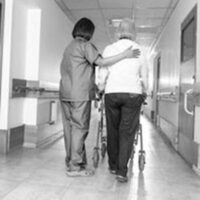Understanding Emotional Abuse in Nursing Homes

When you admit your loved one into a nursing home, you do not expect them to become the victim of abuse. Unfortunately, it happens all too often in South Carolina. When people first think of nursing homes, they often first think of physical abuse. While hitting, pinching, and kicking does sadly occur in nursing homes, emotional abuse is much more common. Below, our Daniel Island nursing home abuse and negligence lawyer explains more.
What is Emotional Abuse?
Emotional abuse in nursing homes consists of any action that causes the resident anguish or emotional harm. It can also be verbal or non-verbal. Emotional abuse has disastrous consequences for nursing home residents. It can result in long-term mental health problems, which can also contribute to the declining health of the resident. Fear, sadness, and anxiety are commonly felt by residents who suffer from emotional abuse.
There are many common forms of emotional abuse and they are as follows:
- Insulting and ridiculing residents,
- Threatening and intimidating residents,
- Shouting or yelling at residents,
- Making residents feel distressed or guilty,
- Isolating residents from family and friends,
- Ignoring residents deliberately to give them the silent treatment,
- Menacing or terrorizing residents,
- Threatening to withhold water and food, and
- Preventing residents from participating in social activities.
Emotional abuse is always a frightening experience. Nursing home residents may not feel as though they have any recourse to make it stop, which can leave them feeling hopeless and frustrated.
Symptoms of Emotional Abuse
Nursing home residents do not always want to come forward with reports of abuse. They often feel ashamed or embarrassed. In other instances, such as when a resident is suffering from dementia, they may not even realize the abuse is occurring. Still, emotional abuse will show many symptoms and it is important for family members to know what these are so they can spot them. The most common symptoms of emotional abuse include:
- Depression
- Withdrawing from others and refusing to speak to or interact with them,
- Agitation,
- Sudden changes in behavior or personality,
- Unusual behavior such as biting, sucking, or rocking, and
- Excessive nervousness or fear.
Over time, emotional abuse can also start to present physical symptoms. These include:
- Sleep issues,
- Loss of appetite,
- Refusal to take medications or eat,
- Sudden weight loss, and
- An increased vulnerability to infection and injury.
If you notice your loved one suffering from the above symptoms, you should speak to someone in the nursing home. If you do not receive an acceptable reason for the symptoms, you should then contact a Daniel Island nursing home abuse and negligence lawyer.
Our Nursing Home Abuse and Negligence Lawyer in Daniel Island Can Help with Your Case
Many elderly nursing home residents cannot care for themselves or take control of a situation that involves emotional abuse. For this reason, if you think your loved one is being treated unfairly, it is important to seek legal advice. At Fuller Law Firm, our Daniel Island nursing home abuse and negligence lawyer can provide it and help your family member obtain the full and fair compensation they deserve. Call us now at 843-277-0013 or contact us online to schedule a consultation.
Source:
scstatehouse.gov/code/t43c035.php
